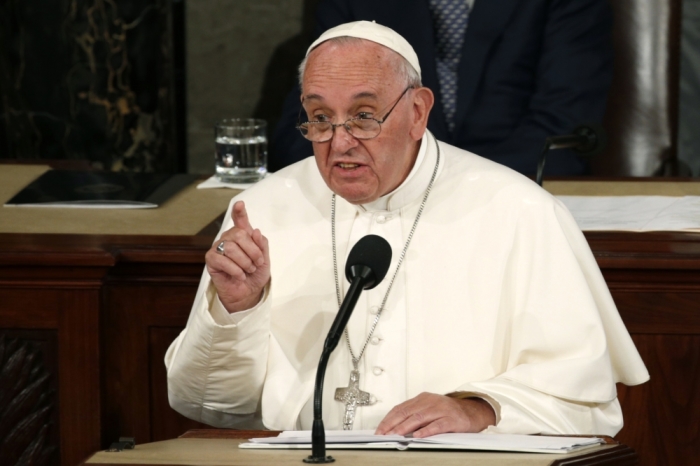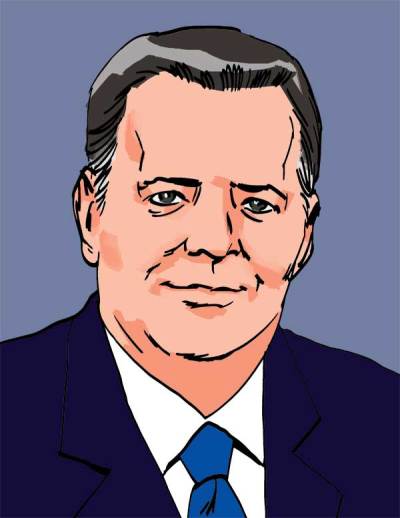Pope Francis Should've Been More Like Mother Teresa in Meeting Kim Davis

Pope Francis made a powerful statement by meeting with gay marriage dissenter Kim Davis. But imagine how much more powerful it would have been had the meeting been public, rather than private.

Pope Francis has come and gone. His five-day sojourn in America started with a visit to Washington, D.C. (including speaking to a joint session of the U.S. Congress), continued in New York City (including a speech to the U.N. General Assembly) and concluded with a World Congress of Families in Philadelphia.
What should one make of this historic visit? The mass appeal generated by the pope's visit, symbolized by a million-person mass in Philadelphia, was extraordinary by any standard or measure. The pope is a head of state (Vatican City), thus a political figure, but primarily and overwhelmingly he is an overtly religious figure in that he is the titular head of the world communion of Roman Catholics.
The massive public outpouring of goodwill and visceral emotion generated by the visit of such an overtly religious figure reveals just how ultimately empty and unfulfilling millions of Americans find their secularizing lives and society to be. Multitudes are clearly yearning for spiritual sustenance.
I cannot help but wonder how many in the left-leaning American secular mass media were mystified, if not down right alarmed, by just how popular Pope Francis proved to be to Americans, no matter how encouraging the media found his support of their political agenda to be.
The incredible grassroots response to the pope's visit certainly calls into question just how rapidly and irreversibly America is secularizing.
In his speech to Congress, and later at the U.N. General Assembly in New York, the pontiff was more overtly political than many conservative Catholics and non-Catholics had hoped he would be.
Some of my conservative Catholic friends ranged from disappointed to grieved that Pope Francis was much more forceful and emphatic when speaking about climate change, economic justice and peace-making (including positive comments about the Iran deal), than he was when dealing with the sanctity of human life, same-sex marriage and religious freedom. Why?
It is certainly true that the Catechism of the Catholic Church requires a "balanced" view of economic policy:
"The Church has rejected the totalitarian and atheistic ideologies associated in modern times with communism or socialism. She has likewise refused to accept, in the practice of capitalism, individualism and the absolute primacy of the law of the marketplace over human labor. Regulating the economy solely by centralized planning perverts the basis of social bonds; regulating it solely by the law of the marketplace fails social justice, for there are many human needs which cannot be satisfied by the market. Reasonable of the marketplace and economic initiatives, in keeping with a just hierarchy of values in a view to the common good, is to be commended" (Catechism of the Catholic Church 2425; A, 10; 13; 44).
Still, the Pope's choice of emphasis concerned and disappointed many conservatives, Catholic and Protestant alike.
As liberal commentator Ruth Marcus put it:
"But for the most part, the statements that put Francis in line with conservatives were muted and indirect — and when, in a year that saw the Supreme Court legalize same-sex marriage, he said 'Fundamental relationships are being called into question, as in the very basis of marriage and the family.'
"By contrast, the Pope was explicit not only on immigration and climate change, but on the death penalty and arms trading ..." (Investor's Business Daily, 9/28/15).
It certainly appeared that the Pope was putting the emphasis on issues associated with the left, at least in public.
In private, it now surfaces, he secretly met with Kentucky Count Clerk Kim Davis and her husband at the Papal Nunciature in Washington, D.C. after his speech to a joint session of Congress.
On Wednesday it was revealed that he had met with the Davises, prayed for her and, according to Mrs. Davis, Pope Francis "thanked me for my courage and told me to 'stay strong.'"
Why meet secretly? Imagine the impact if that visit had been publicized while he was still in the spotlight in America.
I must confess that as I observed the Pope's visit my memory kept going back to another visit from another world renowned and beloved Catholic leader, Mother Teresa, who visited America in 1994 to speak to speak at the National Prayer Breakfast in Washington.
Mother Teresa held the audience spellbound as she made an eloquent plea for the sanctity of all human life from conception to natural death with President Clinton and his wife Hillary sitting less than six feet from the podium. No one who witnessed such brave, eloquent and explicit speaking of truth to power will ever forget it. By the way, as Mother Teresa spoke, the stone-faced First Lady became more and more flushed. I actually thought she might spontaneously combust before the speech was over.
Here is some of what Mother Teresa said:
"But I feel that the greatest destroyer of peace today is abortion, because it is a war against the child — a direct killing of the innocent child — murder by the mother herself. And if we accept that a mother can kill her own child, how can we tell other people not to kill one another?"
She then went on to say "any country that accepts abortion is not teaching people to love, but to use any violence to get what they want. That is why the greatest destroyer of love and peace is abortion."
Then she immediately pressed the point home:
"But what does God say to us? He says, 'even if a mother could forget her child, I will not forget you. I have carved you in the palm of my hand.' We are carved in the palm of His hand — that unborn child has been carved in the hand of God from conception, and is called by God to love and be loved, not only now in this life, but forever. God can never forget us."
Now that is a testimony of the value and dignity of human life.
Imagine if Pope Francis had said that to the joint session of Congress, House Minority Leader Nancy Pelosi might have needed medical assistance.
What a historic tragedy that Pope Francis did not seize his moment the way Mother Teresa did.
Moral capital is like political capital. If you hoard it, and don't invest it in worthy causes, it atrophies and dissipates.




























